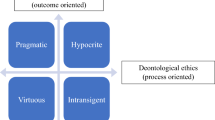Abstract
Constitutivists hope to locate the foundations of ethics in the nature of action. They hope to find norms that are constitutive of agency. Recently David Enoch has argued that even if there are such norms, they cannot provide the last word when it comes to normativity, since they cannot tell us whether we have reason to be agents rather than shmagents. I argue that the force of the shmagency objection has been considerably overestimated, because philosophers on both sides of the debate have failed to grasp the true source of the authority of agency’s constitutive norm. Some constitutivists believe that this authority is rooted in the inescapability of agency. Yet agency is not, in fact, inescapable. What actually grounds the authority of agency’s constitutive norm is the fact that there is no standpoint outside of agency from which we can intelligibly ask normative questions.
Similar content being viewed by others
Notes
More recently Paul Katsafanas has entered the fray (2013, chap. 2).
The paradox of hedonism was christened as such by Henry Sidgwick: “Here comes into view what we may call the fundamental paradox of Hedonism, that the impulse towards pleasure, if too predominant, defeats its own aim” (1913, p. 48).
Defenders of constitutivism often misunderstand this as well. See note 9 below.
This presupposes, of course, that agency’s constitutive norm is robust enough to yield substantive answers to the various pressing internal versions of the shmagency question. Kieran Setiya has recently argued that it is not (2010). (See also Tiffany 2012.) Yet it is no part of Enoch’s shmagency objection to challenge this aspect of the constitutivist strategy. The claim that the constitutive aim of action is too slim to generate a substantive constitutive norm—a norm of sufficient substance to answer all (or even most) of our pressing normative questions—amounts to an entirely different objection to constitutivism. For my response to this further objection (as it is articulated by Setiya), see Silverstein (2010).
Compare Ferrero (2009, p. 312 no. 20).
Compare Velleman (2004, pp. 292–293).
In other words, the authority of agency’s constitutive norm does not depend on agency’s being in any way self-validating. Ferrero’s attempt to address worries about the legitimacy of self-validation (2009, pp. 322–331) and the comments about circularity by both Velleman (2009, pp. 141–142) and Enoch (2011, pp. 221–222) are, therefore, beside the point.
References
Enoch, D. (2006). Agency, shmagency: Why normativity won’t come from what is constitutive of action. Philosophical Review, 115(2), 169–198.
Enoch, D. (2011). Shmagency revisited. In Michael Brady (Ed.), New waves in metaethics. Houndmills, Basingstoke, Hampshire: Palgrave Macmillan.
Ferrero, L. (2009). Constitutivism and the inescapability of agency. Oxford Studies in Metaethics, 4, 303–333.
Frankfurt, H. G. (1988). Freedom of the will and the concept of a person. In The Importance of What We Care About: Philosophical Essays. Cambridge: Cambridge University Press.
Katsafanas, P. (2013). Agency and the foundations of ethics: Nietzschean constitutivism. Oxford: Oxford University Press.
Korsgaard, C. M. (2009). Self-constitution: Agency, identity, and integrity. Oxford: Oxford University Press.
Setiya, K. (2010). Reasons without rationalism. Princeton: Princeton University Press.
Sidgwick, H. (1913). The methods of ethics (7th ed.). London: Macmillan.
Silverstein, M. (2010). The standards of practical reasoning. Philosophical Quarterly, 60(240), 631–638.
Tiffany, E. (2012). Why be an agent? Australasian Journal of Philosophy, 90, 223–233.
Velleman, J. D. (2004). Replies to discussion of the possibility of practical reason. Philosophical Studies, 121(3), 277–298.
Velleman, J. D. (2007). What good is a will? In Anton Leist (Ed.), Action in context. New York: Walter de Gruyter.
Velleman, J. D. (2009). How we get along. Cambridge: Cambridge University Press.
Acknowledgments
I am grateful to an anonymous reviewer for Philosophical Studies, as well as to Stephen Darwall, David Enoch, Allan Gibbard, Jessica Moss, David Owens, Peter Railton, Joshua Silverstein, Phyllis Silverstein, Sharon Street, and David Velleman, for valuable comments on earlier drafts of this paper. I am especially indebted to Nishi Shah, both for his encouragement and for his many helpful suggestions.
Author information
Authors and Affiliations
Corresponding author
Rights and permissions
About this article
Cite this article
Silverstein, M. The shmagency question. Philos Stud 172, 1127–1142 (2015). https://doi.org/10.1007/s11098-014-0340-x
Published:
Issue Date:
DOI: https://doi.org/10.1007/s11098-014-0340-x




